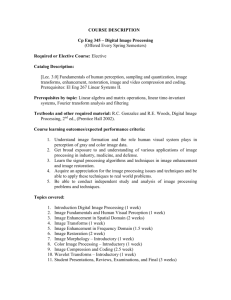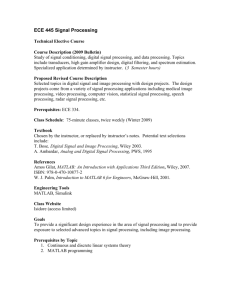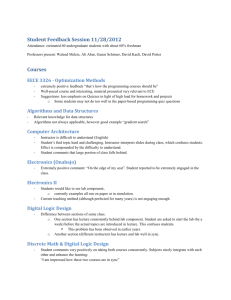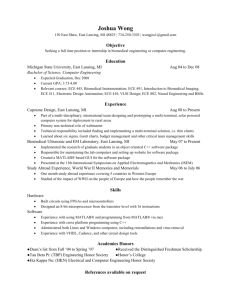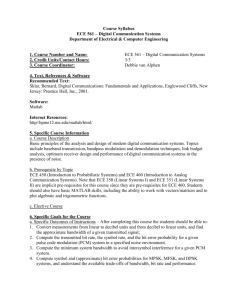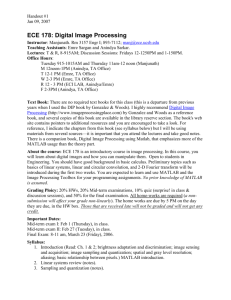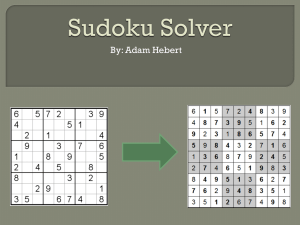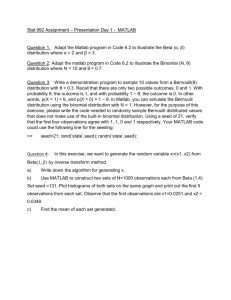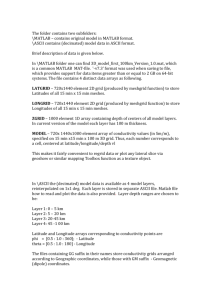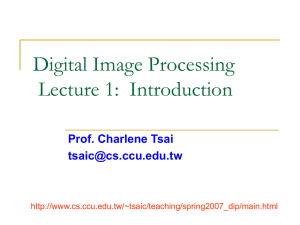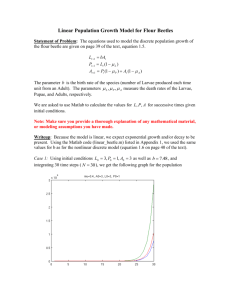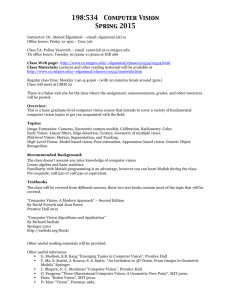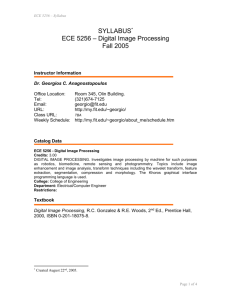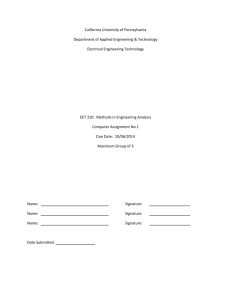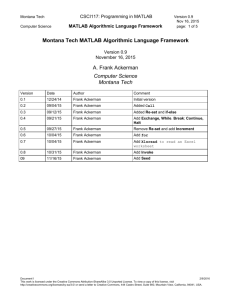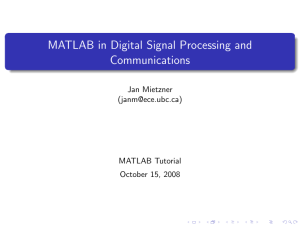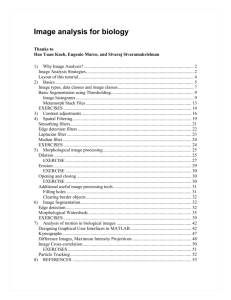doc
advertisement
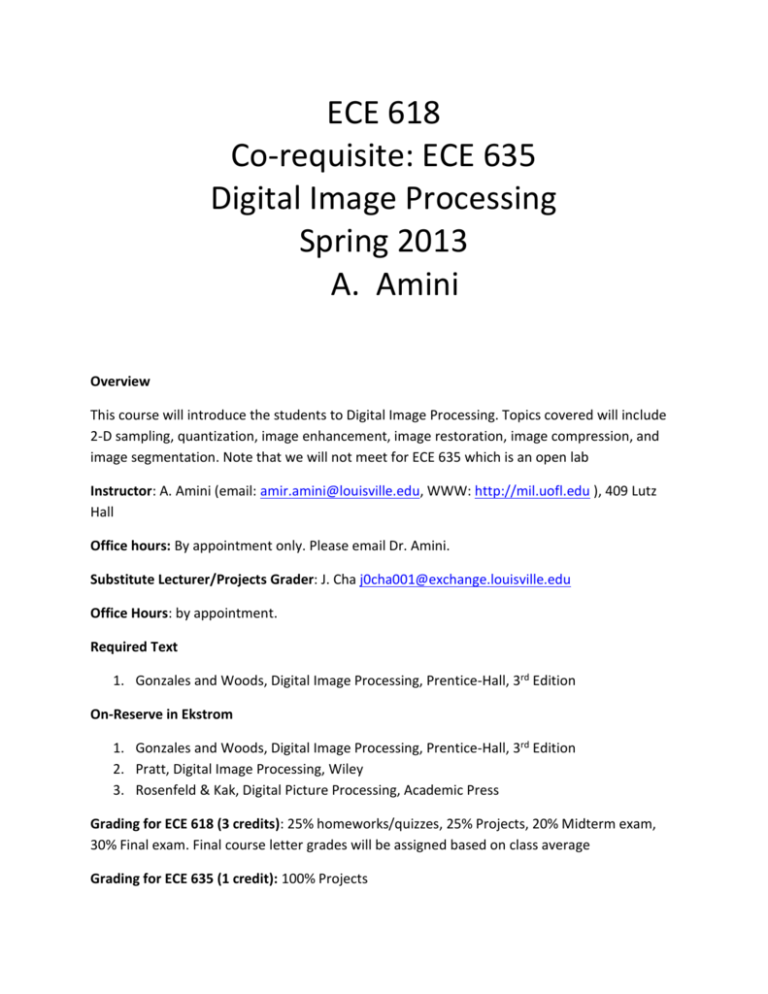
ECE 618 Co-requisite: ECE 635 Digital Image Processing Spring 2013 A. Amini Overview This course will introduce the students to Digital Image Processing. Topics covered will include 2-D sampling, quantization, image enhancement, image restoration, image compression, and image segmentation. Note that we will not meet for ECE 635 which is an open lab Instructor: A. Amini (email: amir.amini@louisville.edu, WWW: http://mil.uofl.edu ), 409 Lutz Hall Office hours: By appointment only. Please email Dr. Amini. Substitute Lecturer/Projects Grader: J. Cha j0cha001@exchange.louisville.edu Office Hours: by appointment. Required Text 1. Gonzales and Woods, Digital Image Processing, Prentice-Hall, 3rd Edition On-Reserve in Ekstrom 1. Gonzales and Woods, Digital Image Processing, Prentice-Hall, 3rd Edition 2. Pratt, Digital Image Processing, Wiley 3. Rosenfeld & Kak, Digital Picture Processing, Academic Press Grading for ECE 618 (3 credits): 25% homeworks/quizzes, 25% Projects, 20% Midterm exam, 30% Final exam. Final course letter grades will be assigned based on class average Grading for ECE 635 (1 credit): 100% Projects Projects: In projects, you will be required to implement image processing algorithms. It is recommended that you use matlab for this purpose. In many cases, the image processing tool box has these routines available and will provide the means to check your implementation. Each student will need to provide a written project report for each project following the project guidelines which will be distributed later in the class. It will be expected that all students will write their own code for the projects. Based on the grading description above, ~44% of the assigned final grade for the 4 credit hours in this course will be based on the projects Blackboard: Lecture notes will be posted on blackboard. Solution to homework problems and quizzes will also be posted on the blackboard. Exams: There will be a midterm and a final exam in the course. Related/Useful Links: 1. Textbook website: http://imageprocessingplace.com 2. List of on-line MATLAB tutorials: http://www.duke.edu/~hpgavin/matlab.html 3. Intro to MATLAB: http://amath.colorado.edu/courses/4720/2000Spr/Labs/Worksheets/Matlab_tutorial/ matlabtutorial.html 4. Intro to Image Processing in MATLABhttp://amath.colorado.edu/courses/4720/2000Spr/Labs/Worksheets/Matlab_t utorial/matlabimpr.html 5. MATLAB demos: http://www.mathworks.com/products/matlab/demos.jsp 6. CV on-line [an on-line book describing many topics in image processing and Computer Vision]: http://homepages.inf.ed.ac.uk/rbf/CVonline/ 7. Database of images http://www.imagelabs.com/library/imagedb.php 8. Database of images http://www.imageprocessingplace.com/root_files_V3/image_databases.htm 9. Computer Vision Handbook: http://www.cs.hmc.edu/~fleck/computer-vision- handbook/index.html Course Learning Outcomes: 1. State properties of linear, shift-invariant imaging systems, point spread functions, Fourier Transforms 2. Derive continuous Fourier Transform of functions of 2 variables 3. Describe 2-D sampling theorem, DFT, FFT 4. Derive and implement image enhancement in the spatial domain 5. Perform image filtering in the frequency domain 6. Describe fundamental techniques of image restoration 7. Describe fundamental techniques of image compression 8. Describe fundamental techniques of image segmentation Topics Covered by Class (approximate): 1. Introduction and Review (2 classes) 2. Digital Image Fundamentals (5 classes) 3. Image Enhancement in the Spatial Domain (7 classes) 4. Image Enhancement in the Frequency Domain (6 classes) 5. Image Restoration (3 classes) 6. Image Compression (3 classes) 7. Image Segmentation (2 classes)
